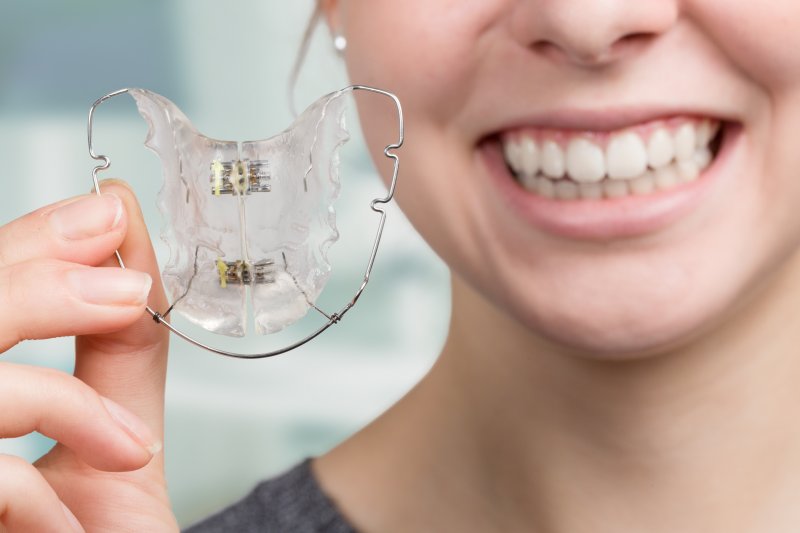Discover the Advantages of Invisalign for a Perfect Smile Makeover
Wiki Article
Invisalign vs. Traditional Braces: Which Choice Is Right for You?
When taking into consideration orthodontic treatment, the option between Invisalign and conventional braces offers numerous essential aspects that merit careful evaluation. Invisalign supplies a very discreet option with detachable aligners, while standard braces provide an extra noticeable yet effective solution for serious misalignment.Review of Therapy Options

In comparison, standard dental braces contain metal braces and cables that are bound to the teeth. This technique applies continual pressure gradually to attain alignment. While efficient for complex orthodontic issues, traditional braces need regular sees for modifications and can position difficulties in keeping dental health as a result of the problem of cleansing around braces and wires.
Both alternatives have their merits, and the choice typically depends upon certain oral conditions, lifestyle choices, and client conformity. Ultimately, speaking with an orthodontic expert is critical for figuring out the most ideal therapy plan tailored to individual requirements. Recognizing the subtleties of each alternative can considerably affect the overall success of orthodontic therapy.
Aesthetic Considerations
A considerable factor affecting the choice between Invisalign and traditional dental braces is the aesthetic appeal each treatment provides. Invisalign aligners are crafted from clear plastic, making them virtually unseen when put on.In contrast, standard braces include steel brackets and cords, which can be much more recognizable. While innovations in orthodontic innovation have caused the growth of smaller brackets and tinted elastics, typical braces still maintain an even more obvious account. For some individuals, the presence of dental braces might deter them from looking for essential treatment.
Eventually, the option between Invisalign and typical braces might rest on individual choices concerning visual appeals. Individuals who focus on discretion frequently lean towards Invisalign, while those who are much less concerned concerning visibility may go with standard dental braces. Recognizing the visual ramifications of each choice is vital for making an educated choice that aligns with one's lifestyle and preferences.
Comfort and Convenience

In terms of ease, Invisalign aligners are about his detachable, allowing patients to enjoy their favored foods without restriction and preserve optimal oral hygiene. Cleaning and flossing are simplified, as the aligners can be obtained during these routines, whereas typical braces need cautious navigating around cords and brackets.
In contrast, typical braces necessitate normal adjustments, making them much less hassle-free for those with active routines. Generally, the convenience and benefit of Invisalign make it an appealing selection for lots of individuals looking for orthodontic treatment.
Treatment Duration and Performance
While both Invisalign and standard dental braces work in correcting dental misalignments, the period of treatment can vary significantly between the 2 alternatives. Generally, Invisalign treatment can take anywhere from 12 to 18 months, relying on the intricacy of the instance. The clear aligners function by gradually moving teeth right into their preferred placements, and regular follow-ups with an orthodontist assistance ensure development continues to be on the right track.
On the other hand, typical braces typically call for a longer commitment, generally varying from 18 months to three years. This results from their fixed nature and the usage of wires and braces, which can be much more efficient for intricate cases and extreme imbalances (Invisalign). The treatment performance of traditional dental braces is well-documented, as they enable for precise adjustments and better control over tooth movement
Eventually, the selection between Invisalign and standard braces might rest on both the awaited therapy duration and the details dental issues available. Consulting with an orthodontist is important, as they can provide tailored recommendations based upon private demands, making sure the selected approach straightens with wanted outcomes and durations.
Price Comparison and Insurance Options
Expense plays a significant duty in the decision-making process for individuals considering orthodontic treatment, whether choosing Invisalign or standard braces. Usually, the cost of Invisalign varieties from $3,000 to $8,000, while traditional dental braces generally set you back in between $2,000 and $6,000. Aspects influencing these prices consist of the complexity of the case, the duration of therapy, and geographical area.Many oral insurance coverage plans provide partial coverage for orthodontic therapies, yet the specifics can vary extensively. Usually, conventional dental braces may be extra regularly covered by insurance coverage strategies compared to Invisalign, which some insurance companies this page categorize as an aesthetic treatment.
In addition, numerous orthodontic techniques supply versatile settlement plans, making both therapy alternatives much more easily accessible. Patients should ask about possible financing options and price cuts for ahead of time repayments. Examining the overall expense, consisting of insurance coverage advantages and layaway plan, is necessary for making an informed decision that aligns with both visual choices and budget factors to consider.

Final Thought
In summary, the option between Invisalign and typical dental braces hinges on several factors, including aesthetic choices, convenience, treatment period, and expense. Invisalign supplies a very discreet, detachable alternative that helps with dental hygiene and nutritional flexibility, while typical dental braces may be better for intricate dental concerns and commonly come at a reduced rate point. Ultimately, appointment with an orthodontist is essential to evaluate private conditions and determine the most ideal therapy alternative for achieving optimum oral positioning.When taking into consideration orthodontic therapy, the choice between Invisalign and conventional dental braces presents numerous vital aspects that merit mindful assessment.Comparing Invisalign and traditional dental braces exposes distinct therapy alternatives for orthodontic modification.While both Invisalign and traditional braces are efficient in remedying dental misalignments, the duration of therapy can vary substantially between the two choices.Price plays a significant duty in the decision-making procedure for individuals taking into consideration orthodontic look at this web-site treatment, whether deciding for Invisalign or standard braces.In summary, the selection in between Invisalign and typical braces hinges on multiple factors, including visual preferences, comfort, treatment duration, and expense.
Report this wiki page